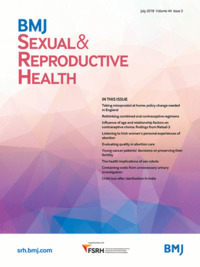About the Article
Published in BMJ Sexual and Reproductive Health

About the study
Background The Republic of Ireland has one of the world’s most restrictive abortion laws, allowing abortion only to preserve a pregnant woman’s life. We examined the impact of the law on women’s options for accessing abortion, their decision-making regarding whichpathway to follow, and their experiences with their chosen approach.
Methods We conducted semi-structured in-depth interviews with 38 women who had either travelled abroad to access abortion in a clinic or had self-managed a medical abortion at home using online telemedicine, between 2010 and 2017. We coded interview transcripts according to an iteratively developed coding guide and performed a thematic analysis to identify key themes.
Results We identified four key themes: (1) self-managing a medical abortion at home using online telemedicine can be a preference over travelling abroad to access abortion services; (2) regardless of the pathway chosen, women experience a lack of pre- and post-abortion support in the Irish healthcare system; (3) feelings of desperation while searching for safe abortion care can lead to considering or attempting dangerous methods; and (4) Irish abortion law and attitudes have impacts beyond physical health considerations, engendering shame and stigma.
Conclusions Despite the country’s restrictive abortion law, women in Ireland do obtain abortions, using methods that are legal and safe elsewhere. However, the law negatively impacts women’s ability to discuss their options with their healthcare professionals and to seek follow-up care, and can have serious implications for their physical and emotional health. This study’s findings provide evidence to inform public and policy discourse on Ireland’s abortion laws.
Reach & impact
• In May 2018, The Republic of Ireland held a referendum to repeal the Eighth Amendment to the Irish Constitution, which guaranteed fetuses the same right to life as pregnant people, essentially outlawing abortion in the country. In October 2017, our research team, Project SANA, was invited to address the Irish Parliamentary Committee (the Oireachtas Committee). The Committee recommended allowing abortion upon request up to 12 weeks gestation, and cited the evidence provided by Project SANA a pivotal part on the decision.
• Media coverage: The Irish Times, The Guardian
